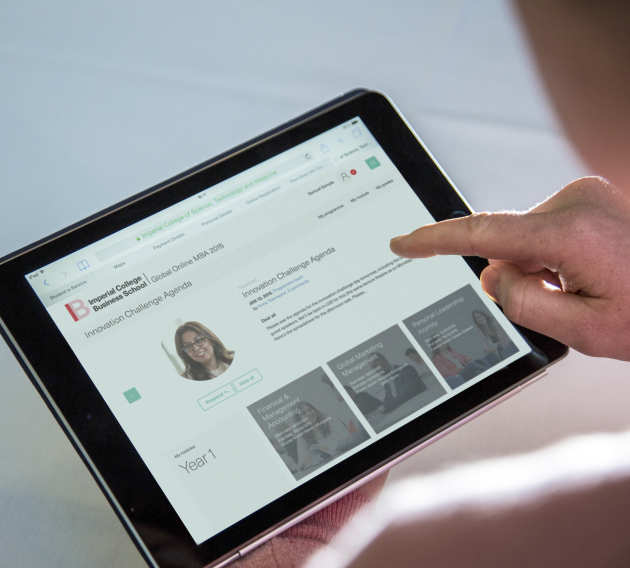 Some people see virtual education as an easy way of offering cut-price education, but not Dr David Lefevre. As the man who created Imperial’s first online degree programme, the Global MBA, he is clearly passionate about the benefits of this approach.
Some people see virtual education as an easy way of offering cut-price education, but not Dr David Lefevre. As the man who created Imperial’s first online degree programme, the Global MBA, he is clearly passionate about the benefits of this approach.
He says: “The Global MBA has been a great success. Students on the course are the most satisfied in the Business School, and Business School students are already some of the most satisfied at Imperial. And the performance of our GMBA students matches those studying for the traditional full and part time MBAs.”
The obvious benefit of a virtual degree is that students do not have to be on campus, or even in the same country, as the university. Global MBA pupils visit South Kensington just twice over their two-year part-time course, once at the start of their first year and again at the start of their second.
“Our students are people who couldn’t study at Imperial in the traditional way because of their time-commitments or their location. For example, our students include the manager of a nuclear power station, a tech entrepreneur based in New York and the COO of a firm manufacturing private jets,” Dr Lefevre explains. “And these are exactly the kind of student Imperial needs to have influence in business.”
Student comment
“For me the greatest thing is the fact that I can learn anywhere and anytime. I could be picking my kids up from an extracurricular activity and be able to log into The Hub and get through a certain section I’m studying.”
Khilona Radia, Global Online MBA 2016-17, Business Owner, Health sector
To set up the programme, existing MBA course content had to be digitised – a massive undertaking but one that brings additional benefits. “We ran a pilot project last year in which we repurposed some Global MBA courses for use with undergraduate engineering students. This allowed us to deliver online modules in topics such as economics, accounting and entrepreneurship to our campus based students.
“Again it’s been very successful – students appreciate the flexibility of the format and they perform well in examinations. This year we are delivering online courses to 600 undergraduate students,” Dr Lefevre says. “These students are already on campus but before the online module was available, it was almost impossible to schedule the courses effectively due to timetable clashes across departments.”
In addition, the capability built to support the Global MBA is now being expanded into Imperial’s partnership with edX, a non-profit organisation that offers free online education from some of the world’s best universities. Imperial’s first offering via edX is a series of courses designed to prepare students to pursue a full MBA.
The challenge of change
“Having the vision is easy - actually the easiest part of the process - and the technology is also getting easier,” says Dr Lefevre. “The challenging part relates to organisational change. Switching to online teaching and learning means that everyone involved has to do their job in a slightly different way.”
 He explains that online learning forces teachers to approach lessons differently: “Giving a lecture is a very autonomous process for the teacher. The lecture theatre is a private domain. However, to deliver online courses our academic staff need to adopt a team approach, often working together with an instructional designer and a teaching assistant. They also need to work with staff such as media specialists who develop the online courseware.”
He explains that online learning forces teachers to approach lessons differently: “Giving a lecture is a very autonomous process for the teacher. The lecture theatre is a private domain. However, to deliver online courses our academic staff need to adopt a team approach, often working together with an instructional designer and a teaching assistant. They also need to work with staff such as media specialists who develop the online courseware.”
Change is also inevitable for support staff who have to learn to recruit and then deal with students via software rather than face to face.
Dr Lefevre says the whole process has taken around a decade but his motivation is clear: “We hope to use technology to enhance the learning experience of all students. For example, on a typical course students spend 80 per cent of their study time outside the classroom. This can be a very isolating experience but when students log in to our online environment they have access to help, support and a sense of community.”
“Not all academic staff like teaching in this way, but many do. And our goal is not to reduce cost or make our own lives more convenient, it’s done because we believe it’s the best way to teach and learn. It can enhance the experience.”
Sign Up
If you are interested in receiving the Learning and Teaching Newsletter, please email ltstrategy@ic.ac.uk.
You can also view the issue archive online.

